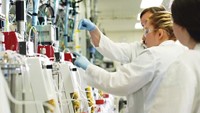Advertisement
Grab your lab coat. Let's get started
Welcome!
Welcome!
Create an account below to get 6 C&EN articles per month, receive newsletters and more - all free.
It seems this is your first time logging in online. Please enter the following information to continue.
As an ACS member you automatically get access to this site. All we need is few more details to create your reading experience.
Not you? Sign in with a different account.
Not you? Sign in with a different account.
ERROR 1
ERROR 1
ERROR 2
ERROR 2
ERROR 2
ERROR 2
ERROR 2
Password and Confirm password must match.
If you have an ACS member number, please enter it here so we can link this account to your membership. (optional)
ERROR 2
ACS values your privacy. By submitting your information, you are gaining access to C&EN and subscribing to our weekly newsletter. We use the information you provide to make your reading experience better, and we will never sell your data to third party members.
Biobased Chemicals
Genomatica and Unilever launch venture for alternatives to palm oil
New venture will focus on ingredients for home and personal care products
by Craig Bettenhausen
June 17, 2022

The industrial biotech firm Genomatica and the consumer product maker Unilever have formed a joint venture that will develop fermentation-derived versions of home and personal care ingredients that are normally made from palm oil.
The partners are launching the new venture with a $120 million investment and hope other firms will join, according to Genomatica CEO Christophe Schilling. Though the firms are not yet disclosing which molecules they’ll target, Schilling says the focus will be on surfactants. In home and personal care, these are often made from the C16–18 fatty acids found in palm oil and palm kernel oil.
Schilling says the partners decided to work on palm alternatives because of the sustainability impact. Although some palm oil is produced using sustainable agriculture practices, the growth in demand for sustainable palm-derived products is outstripping the growth in supply, he says. Conventional palm plantations, meanwhile, are often ecological and climate nightmares, and many western consumer product makers try to avoid sourcing oil from them.
Schilling says the new venture’s technology will use plant-based, non-oil carbohydrates as its feedstock. The resulting products will have carbon footprints half the size or less of conventionally-produced options, he says.
The palm replacement effort is the first major outing for Genomatica’s long-carbon-chain technology platform, which it purchased from Renewable Energy Group in 2019 to complement its four- and six-carbon technologies. Schilling expects the venture to build plants with capacities between 10,000 and 100,000 metric tons per year.
The venture will join a handful of other efforts aimed at solving the palm problem. The start-up C16 Biosciences is similarly using biotechnology to get the same surfactant molecules without the troublesome palm plant. Others such as Locus Performance Ingredients and Holiferm are commercializing new surfactant molecules to replace palm derivatives.
BASF, meanwhile, is rolling out a blockchain-based tracking technology that can show consumers exactly where the palm ingredients they buy come from—and even allow them to tip individual farmers. And of course, petrochemical alternatives are available, though that option is unpopular in the personal care market.
“Scientists have used many exotic alternatives to mimic palm oil; whether these are economical has yet to be proven,” says Rina Singh, executive vice president of the nonprofit Alternative Fuels and Chemicals Coalition. She says it’s exciting to see Genomatica and Unilever using industrial biotechnology to create renewable specialty chemicals.
Genomatica, which has raised more than $300 million from investors, is becoming more and more active in consumer-facing applications for its biotechnology, Schilling says. In 2021, the firm signed a deal with the athletic clothing maker Lululemon to develop biobased nylon; it also formed a joint venture called Qore with the agriculture giant Cargill to make biobased 1,4-butanediol, a spandex starting material, in Iowa. Genomatica has also been expanding its production of butylene glycol, which it markets as a perfume solvent under the name Brontide.
Although Schilling says he is rooting for companies bringing out new molecules with exciting new properties, “we’ve always focused on direct replacement” of existing molecules. He says the firm’s approach is to pick commercial chemicals and use synthetic biology to make them from sustainable or renewable feedstocks. “If we’re successful with these technologies, we believe that that’s going to drive much more widespread and larger scale adoption, which then drives a much larger sustainability impact.”





Join the conversation
Contact the reporter
Submit a Letter to the Editor for publication
Engage with us on Twitter